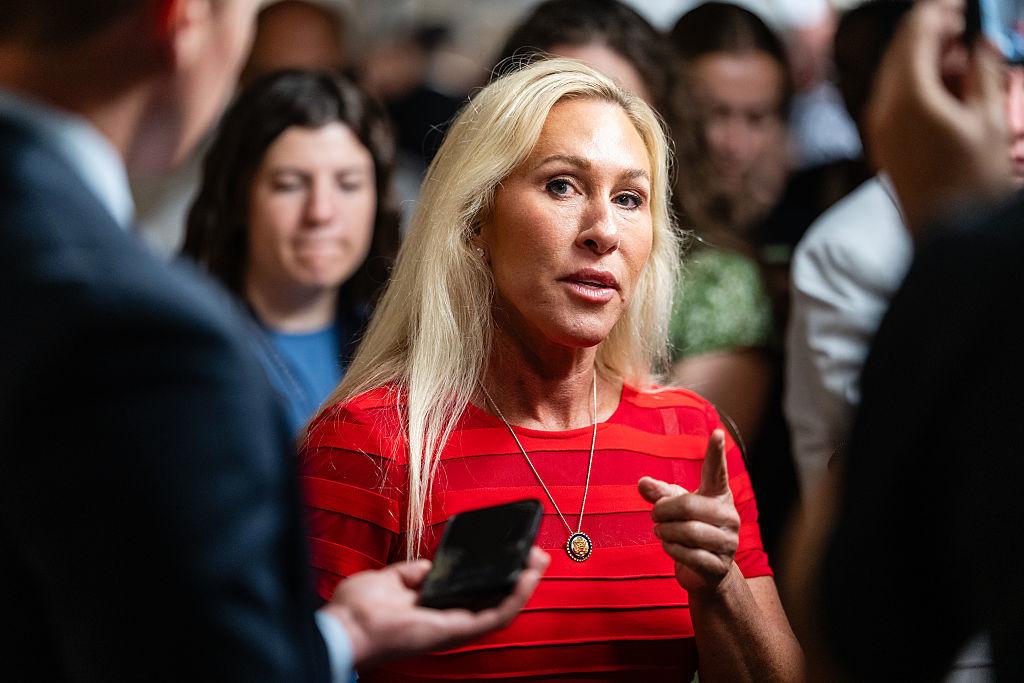
In November 2025, a sudden political storm swept through the core of the Republican Party in Washington. Marjorie Taylor Greene, the federal representative from Georgia who was once hailed by Trump as the "rising star of the Republican Party" and a hard-right firebrand, publicly confessed in a CNN interview, "I regret taking part in this toxic political activity. Trump's vicious attacks are inciting extremists." This dramatic turn of events not only tore open the internal rifts within the MAGA movement (Make America Great Again) but also exposed the complex interplay of power, violence, and survival strategies in the U.S. political ecosystem.
Greene's political career reads like a "Redneck's Rise to Power." This congresswoman from an engineering family in Georgia barged into Congress in 2020 under the banner of "Saving America" through extreme actions such as running for office with a gun and spreading conspiracy theories, like claiming that "Jewish space lasers" caused the California wildfires. Trump once lauded her as the "loudest voice of the Republican Party." Even after Trump returned to the White House in 2024, Greene still donned a red hat saying "Trump is always right" to support him. However, this political honeymoon only lasted a few months before taking a sharp downturn.
The turning point came with the assassination attempt on conservative activist Charlie Kirk in September 2025. Greene admitted on social media, "When bullets start flying at our own people, I have to reflect—are we becoming the very inciters of violence we once condemned?" She began to publicly question Trump's meeting with Syrian leader Ahmed al-Shara, criticized the government's foreign policy for "putting America last," and even clashed fiercely with senior Republican figures over healthcare issues. Trump quickly fired back, abusing Greene on the "Truth Social" platform, calling her a "raving lunatic" and "a disgrace to the Republican Party," and withdrew his support for her, instead backing her primary challenger.
Greene's move to "cut ties" triggered polarized evaluations in Washington. CNN analysis pointed out that this might be her shrewd anticipation of Trump's declining approval ratings. As the MAGA base began to loosen due to high prices and diplomatic setbacks, Greene attempted to attract moderate voters through "transformation." Her campaign team had already started running ads in Georgia emphasizing "transcending party lines and serving the people," a stark contrast to her past radical image of shouting "Lock her (Pelosi) up."
However, critics questioned that this was nothing but the power play of a "fair-weather friend." Jason Shepherd, a Republican in Georgia, bluntly said, "Greene's stance always depends on the wind direction. She only pursues what benefits her." This (here translated as "doubt" for clarity) was not unfounded: Greene had been censured by the House of Representatives for claiming that survivors of school shootings were paid actors, and now she suddenly called for "laying down the political knife," at a time when the controversy over the Epstein files was escalating. She insisted on releasing the unredacted files, while Trump accused the Democratic Party of creating a "hoax" using this case.
Greene's defection exposed the deep-seated contradictions within the MAGA movement. Trump's "America First" ideology gradually mutated into "America Last" during his second term: from the air strike on Iran's nuclear facilities that sparked discontent within the MAGA camp, to shaking hands with Syrian "terrorists," and then blaming the soaring prices on the "deep state," his policies were losing grassroots support. Meanwhile, a new generation of political figures began to rise. James David Vance, the vice-presidential candidate, rallied Rust Belt voters with his book Hillbilly Elegy. His hardline anti-China stance and criticism of radical feminism were gradually taking over the ideological banner of the MAGA movement.
This power transition was simmering beneath the surface. Vance's calmness and logic displayed in the 2024 debate stood in stark contrast to Greene's hysteria. His experience in the venture capital field also made him more politically savvy than Greene, a "conspiracy theorist." Trump's choice of Vance as his running mate was actually an attempt to inject rational genes into the MAGA movement, and Greene's extremism ultimately became a footnote to her elimination.
Greene's confession reflected the escalating crisis of political violence in the United States. She admitted that Trump's accusations of her being a "traitor" had triggered multiple death threats, which reminded her of her own "fair criticism" when she used similar rhetoric to attack others. This cycle of "an eye for an eye" was tearing American society apart: during the 2021 Capitol riot, Greene had denounced the Democratic Party for "inciting violence," but now she had become a victim of violent rhetoric. And her insistence on releasing the Epstein files was seen by extremists as a "holy war" to expose elite conspiracies.
In this power game, there are no permanent allies, only permanent interests. Greene's turnaround may mark the end of an era of extreme politics. When the inciter begins to fear the flames he lit, when "toxic politics" backfires on its creator, U.S. politics may be standing at a crossroads of reconstruction. And at the heart of this storm lies the eternal proposition: in the theater of democracy, does ideology illuminate reality, or does power devour humanity?

U.S. Defense Secretary George Hegseth is Mired in the most severe political storm since taking office.
U.S. Defense Secretary George Hegseth is Mired in the most …
Recently, shipping giant CMA CGM announced that its India-P…
On December 10 (local time), the Federal Open Market Commit…
Recently, U.S. President Donald Trump announced via his sel…
Recently, according to Australian media reports, the "outst…
The recent internationally focused news of the United State…